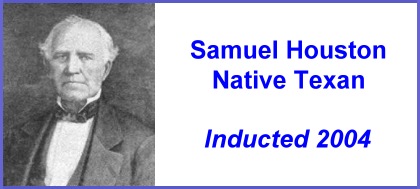Sam Houston
Samuel Houston is one of the most colorful and controversial figures in Texas history. Throughout his adult life, Houston straddled two cultures, Native American and that of European settlers. His deep understanding and appreciation of both parties permitted him to enlist the assistance of the Native Americans when necessary and serve as an honest broker between the two when circumstances dictated.
It was during an extended stay of three years with the Cherokees of Tennessee that Houston was given his nickname. Chief Oolooteka, his adopted Indian father, called Houston Colonneh or “The Raven.” Houston viewed the Cherokee as his surrogate family. Because of this close personal bond, he maintained great sympathy towards Native Americans.
Houston was deeply embroiled in politics. He was a member of congress from Tennessee, a protégé of Andrew Jackson and worked mightily on Jackson’s unsuccessful presidential bid. Later, he was elected governor of Tennessee at 34 years of age.
Houston’s political career ended abruptly with the break up of his first marriage to Eliza Allen. Under mysterious circumstances, Houston resigned from office and fled across the Mississippi River into Indian territory. He remained there for three years in self imposed exile. While there, he remarried and served the tribe in numerous capacities.
In 1832, Houston left his second wife and embarked into Mexican Texas. Houston saw Texas as a “Land of Promise.” It represented a place ripe for a man of action. He saw it as a place motivated individuals could gain financially and politically.
Houston proved himself correct.
Houston served on the Convention of 1833 in San Felipe where he sided with elements favoring the dissolution of relations with Mexico. Two years later at the Consultation of 1835 Houston was named Major General of the Texas army.
Houston’s bond with the Cherokee people served the cause of Texas freedom. He negotiated a peace treaty with the tribes of East Texas thereby assuring Texas forces would only face enemies in the West.
When Texas declared independence on March 2, 1836 Houston’s appointment as Major General of the Texas army was reconfirmed. At that point, he set about acquiring and organizing the Texas army he was to command.
The clash of cultures culminated in the epic battle of San Jacinto on April 21, 1836. Here Houston and his Texans halted and defeated the overwhelming forces of General Antonio Lopez de Santa Ana, Dictator of Mexico. With Santa Ana in custody, Texas secured its independence.
Houston then went on to become the first regularly elected President of the Republic of Texas and later served as a United States Senator when Texas was annexed.
Animated, active, self-directed, powerful men drive the character and soul of a nation. The cause of Texas Independence is blessed to have attracted a man of the caliber and courage of Sam Houston. For that we are grateful.





